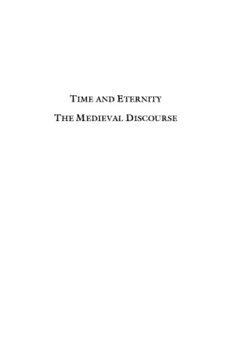
Time and Eternity: The Medieval Discourse PDF
548 Pages·2002·8.612 MB·English
Most books are stored in the elastic cloud where traffic is expensive. For this reason, we have a limit on daily download.
Preview Time and Eternity: The Medieval Discourse
Description:
This volume is composed of selected papers from the main strand, ?Time and Eternity?, at the seventh International Medieval Congress held in July 2000 at Leeds. It attests to the fact that the medieval experience of time and eternity was rich and complex, and that its investigation is open to various approaches and methods. Time and (the possibility of impossibility of) its beginning and its end were frontiers to be explored and to be understood. To make the reader more familiar with the field of study, the volume begins with Wesley Stevens?s plenary address ?A Present Sense of Things Past: Quid est enim tempus?, a stimulating introduction not only with regard to some of the basic problems in conceptualizing the nature of time but also to the dating of historical events and the use of calendars for that purpose. Following Stevens?s essay, the volume is organized into seven broader themes covering a variety of questions and trying to offer new insights into the medieval perception and constructions of time. They deal with the computation of time and the use of calendars; Jewish concepts of time and redemption; Christian philosophies of eternity and time; monastic and clerical conceptions; literary representations; time and art; and apocalyptic expectations. The volume?s selection of authors is international in scope and represents some of the leading current scholarship in the field. It proves that we still ?thirst to know the power and the nature of time? (St Augustine).
See more
The list of books you might like
Most books are stored in the elastic cloud where traffic is expensive. For this reason, we have a limit on daily download.
